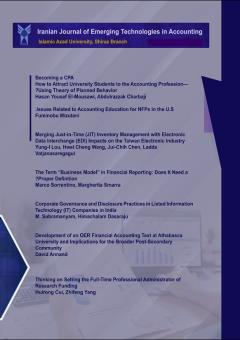Presenting a Model for Contributing Factors to Fin Tech Implementation in the Banking System of a Country Using a Blended Approach
Subject Areas : • Emerging technology in the field of Accounting and its future
Farideh Mohammadi
1
,
Roya Darabi
2
*
,
Hossein Badiei
3
![]()
1 - Ph.D Student, Department of Finance, South Tehran Branch, Islamic Azad University, Tehran, Iran
2 - Associate Professor, Department of Accounting, South Tehran Branch, Islamic Azad University, Tehran, Iran
3 - Assistant Professor, Department of Accounting, South Tehran Branch, Islamic Azad University, Tehran, Iran
Keywords: Financial Startups, Fin Tech, Implementation, Banking System, Blended, Theme, Validation,
Abstract :
Objectives: This paper aims to identify and present a model for the contributing factors to FinTech implementation in the country's banking system using a blended approach. Design/methodology/approach: The scholar initially analyzed 30 specialists in the banking system in various stages in the qualitative section using a mixed approach. Secondly, in the quantitative section, the efficacy of variables was evaluated by distributing a questionnaire among 267 employees of Bank Refah Kargaran. This was conducted using Smart PLS Software and a structural equation approach. Results: The results indicate that factors such as "economic governance of the state," "culture building and training," "structural preparation," "banking system transparency," and "facilities and incentives" can impact the implementation of FinTech in the banking system. Additionally, quantitative analysis in the next phase demonstrates that all research constructs, presented as five hypotheses, play a direct role in influencing FinTech implementation in the financial system. Originality/value: As traditional banking around the world is transitioning into digital evolution, this paper focuses on one of the significant events in digital banking: FinTech. Despite the importance of FinTech, there have been few studies on its implementation.
Arner, D. W., Barberis, J., & Buckley, R. P. (2016). 150 Years of Fintech: An Evolutionary Analysis. Jassa, (3), 22–29.
Baker, T. H. (2017). FinTech Alternatives to Short-term Small-dollar Credit: Helping low-income Working Families Escape the High-cost Lending Trap. Harvard Kennedy School M-RCBG Associate Working Paper, (88).
Balyuk, T., & Davydenko, S. (2019). Reintermediation in FinTech: Evidence from Online Lending. Michael J. Brennan, Irish Finance Working Paper Series Research Paper (18–17).
Balyuk, T. (2016). Financial Innovation and Borrowers: Evidence from Peer-to-peer Lending. University of Toronto-Rotman School of Management.
Bhandari, V. (2021). FinTech: A Study of Enablers, Opportunities, and Challenges in the Banking and Financial Services Sector. ResearchAnthology on Concepts, Applications, and Challenges of FinTech (pp. 24-31). IGI Global.
Chen, L. (2016). From Fintech to in Life: the Case of Fintech Development in China. China Economic Journal, 9(3), 225-239. https://doi.org/10.1080/17538963.2016.1215057
Chishti, S., & Barberis, J. (2016). The Fintech Book: The Financial Technology Handbook for Investors, Entrepreneurs, and Visionaries. John Wiley & Sons.
Drasch, B. J., Schweizer, A., & Urbach, N. (2018). Integrating the ‘Troublemakers’: A Taxonomy for Cooperation between Banks and Fin Techs. Journal of Economics and Business, 100, 26–42. https://doi.org/10.1016/j.jeconbus.2018.04.002
Fortnum, D., Pollari, I., Mead, W., Hughes, B., & Speier, A. (2017). The pulse of fintech Q1 2017: Global analysis of investment in fintech. KPMG. Recuperado de https://bit. ly/3x0nqJY.
Gabor, D., & Brooks, S. (2017). The digital revolution in financial inclusion: international development in the fintech era. New Political Economy, 22(4), 423–436,https://doi.org/10.1080/13563467.2017.1259298.
Gai, K., Qiu, M., & Sun, X. (2018). A survey on FinTech. Journal of Network and Computer Applications, 103, 262-273. https://doi.org/10.1016/j.jnca.2017.10.011
Hertzberg, A., Liberman, A., & Paravisini, D. (2018). Screening on Loan Terms: Evidence from Maturity Choice in Consumer Credit. The Review of Financial Studies, 31(9), 3532–3567.
Hughes, J. P., Jagtiani, J., & Moon, C. G. (2022). Consumer Lending Efficiency: Commercial Banks versus FinTech Lenders. Financial Innovation, 8(1), 1-39.
Jagtiani, J., & Lemieux, C. (2018). Do Fintech Lenders Penetrate Areas that are Underserved by Traditional Banks? Journal of Economics and Business, 100, 43–54. https://doi.org/10.1016/j.jeconbus.2018.03.001
Jagtiani, J., & Lemieux, C. (2019). The Roles of Alternative Data and Machine Learning in Fintech Lending: Evidence from the Lending Club Consumer Platform. Financial Management, 48(4), 1009-1029. https://doi.org/10.1111/fima.12295
Jagtiani, J., Lambie-Hanson, L., & Lambie-Hanson, T. (2021). Fintech Lending and Mortgage Credit Access. The Journal of FinTech, 1(01), 2050004.
Jaubert, M., Marcu, S., Ullrich, M., Malbate, J. B., & Dela, R. (2014). Going Digital: The Banking Transformation Roadmap. AT Kearney.
Lee, I., & Shin, Y. J. (2018). Fintech: Ecosystem, Business Models, Investment Decisions, and Challenges. Business Horizons, 61(1), 35–46. https://doi.org/10.1016/j.bushor.2017.09.003
Llewellyn, D. T. (2014). Reforming the Culture of Banking: Restoring Trust and Confidence in Banking. Journal of Financial Management, Markets, and Institutions, 2(2), 221-236. https://doi.org/10.12831/78760
Szpringer, W. (2016). FinTech is a New Phenomenon in the Financial Services Market. E-MENTOR, (2), 56–69.
Kaur, D., Sahdev, S. L., Sharma, D., & Siddiqui, L. (2020). Banking 4.0:The Influence of Artificial Intelligence on the Banking Industry & How AI Is Changing the Face of Modern-Day Banks. International Journal of Management, 11(6),577-585
Suryono, R. R., Budi, I., & Purwandari, B. (2020). Challenges and Trends of Financial Technology (Fintech): a Systematic Literature Review. Information, 11(12), 590. https://doi.org/10.3390/info11120590
Tang, H. (2019). Peer-to-peer Lenders versus Banks: Substitutes or Complements? The Review of Financial Studies, 32(5), 1900–1938. https://doi.org/10.1093/rfs/hhy137
Wei, Z., & Lin, M. (2017). Market Mechanisms in Online Peer-to-peer Lending. Management Science, 63(12), 4236–4257. https://doi.org/10.1287/mnsc.2016.2531

